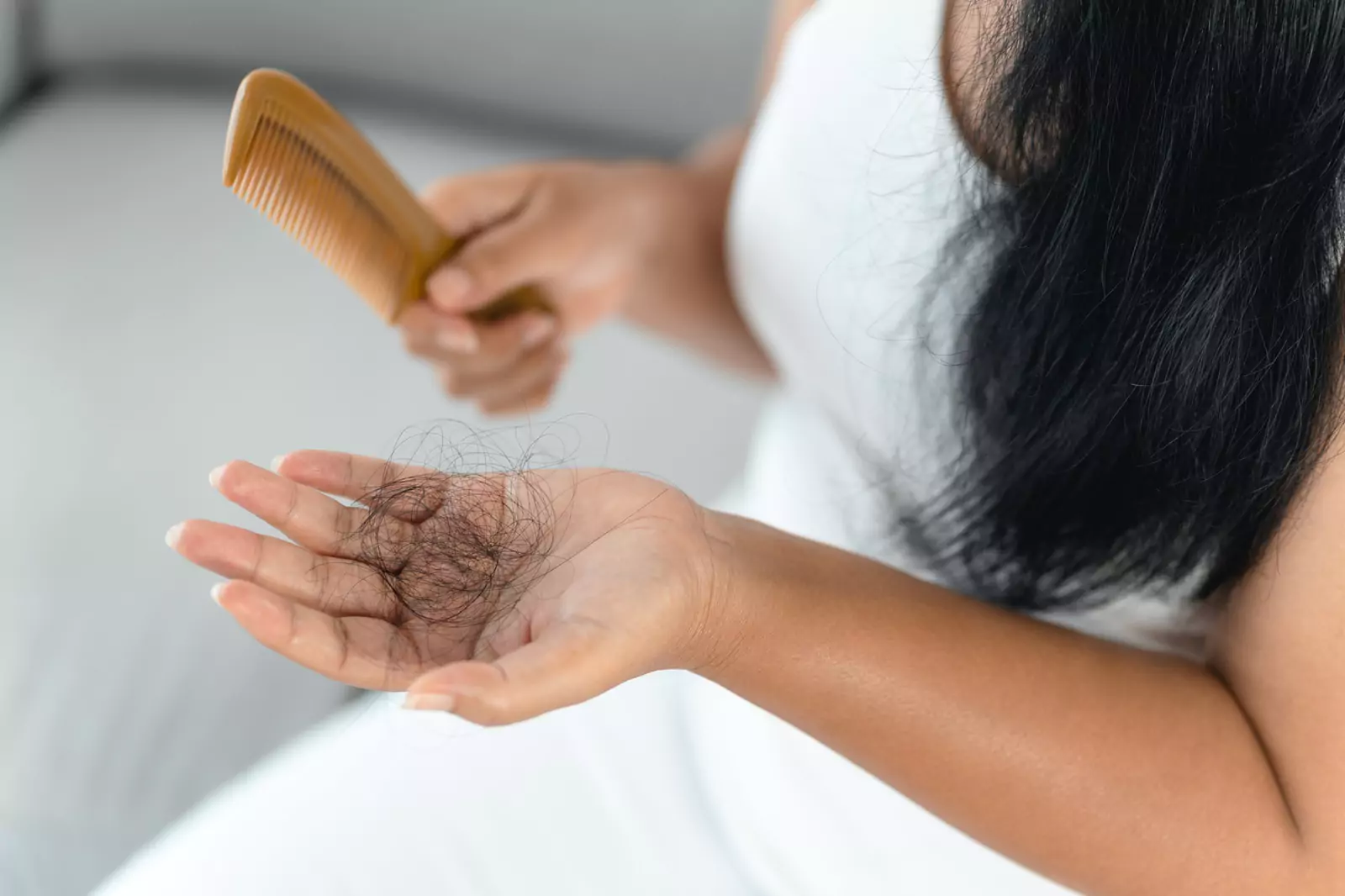
UP TO 40% OFF SITEWIDE






Why Can Hair Loss Occur After Weight Loss?


Weight loss is often seen as a positive step towards better health and wellbeing but sometimes it can come with unexpected side effects. One of these is hair loss. For some, losing weight can cause hair to thin or even fall out completely. It's a troubling experience for anyone who is trying to get healthier and can be discouraging after all of the hard work put into making lifestyle changes.
In this article, we'll explore the possible causes of post-weight loss hair loss and what you can do to reduce the risk of hair loss. We'll also address whether or not hair loss is a side effect of weight loss.
Is Hair Loss A Side Effect Of Weight Loss?
The answer to this question is that hair loss can be a side effect of weight loss but it is not always the case. Weight loss can cause a decrease in the body's production of certain hormones which can in turn lead to hair loss. But it is important to note that not everyone who loses weight will experience this side effect.
The most common kind of hair loss associated with weight loss is telogen effluvium. This is a condition in which the hair follicles are "pushed" into a resting state due to sudden and intense physical or emotional stress. This kind of hair loss usually occurs 2-3 months after the stress has been experienced and can be temporary or long-term.
It is also important to note that even if you are losing weight, it is still important to maintain a healthy and balanced diet. Not getting enough essential vitamins and minerals can also lead to hair loss so it is important to ensure that you are getting the nutrients you need. Taking care of your hair by using appropriate shampoo and conditioners and avoiding excessive use of heat tools can also help to reduce the risk of hair loss.
Hair loss is a common side effect of weight loss and can be unavoidable but there are steps you can take to reduce the risk. Eating a healthy diet, taking care of your hair, and talking to your doctor can help lower the chances of losing your hair due to weight loss.
Causes of Post-Weight Loss Hair Loss
Yes, it’s true, weight loss is a great accomplishment but it can also lead to unexpected side effects such as hair loss. Hair loss has been associated with weight loss due to nutrient deficiencies, changes in hormones, and other factors that can come with reduced caloric intake. Let’s talk about some of its causes below:
Thyroid Issues
This is because drastic weight loss can cause a decrease in the production of the thyroid hormone which can lead to hypothyroidism. When the body does not have enough of this hormone, it can cause the body to experience a range of symptoms including fatigue, dry skin, constipation, and, yes, hair loss. It is important to talk to a doctor if you are experiencing thyroid issues or any other issues related to rapid weight loss.
Hormonal Changes
Weight loss can bring about hormonal changes in the body. These changes can occur due to the reduced amount of fat stored in the body. Fat synthetizes hormones and the decreased amount may lead to a decrease in levels of hormones in the body. One such hormone that can be affected is estrogen which plays an important role in hair growth. Low levels of estrogen can lead to hair thinning or hair loss. Therefore, it is important to be aware of the potential side effects of weight loss.
Nutritional Deficiencies
Weight loss itself is not usually the cause of hair loss but instead can be related to what a person eats while trying to lose weight. Nutrient deficiencies such as protein and iron can lead to hair loss, especially if the diet is extremely restrictive. Low-calorie diets, skipping meals, and following a severely restricted diet can all lead to nutritional deficiencies and the risks associated with them such as hair loss.
Taking supplements and consuming a balanced diet, rich in vitamins and minerals can help prevent nutritional deficiencies and the potential side effects such as hair loss. Additionally, proper hydration is also important for healthy hair growth.
Treatment Options
For individuals experiencing hair loss as a result of weight loss, there are various treatment options available. It is important to understand, however, that not all treatments will work for everyone. Some common treatments that may be used to address hair loss include: -Rogaine/minoxidil: Rogaine or minoxidil, is a treatment that can be applied directly to the scalp. It is available over the counter in various concentrations (2%, 5%, or extra strength) and works by stimulating hair growth.
Oral Medications
Certain medications such as finasteride can be taken orally and can slow the development of hair loss while promoting hair regrowth. Finasteride can be found in a generic form or as Propecia. -Hair transplants: Hair transplants involve harvesting hair follicles from an area of the scalp and implanting them into areas where hair loss has occurred.
Topical medications
These types of treatments help to reduce the inflammation in the scalp and can be applied directly to the areas of the scalp that are affected by hair loss. -Dietary considerations: In some cases, making dietary changes to support overall health such as reducing sugar and processed foods, may be beneficial in helping to reduce hair loss.
Wegovy
Wegovy is a prescription weight-loss medication, also known as semaglutide. While Wegovy does not directly cause hair loss some individuals may experience it as a side effect so it is important for individuals to discuss any potential side effects with their doctor before starting Wegovy.
Ultimately, it is important for individuals to work with their healthcare provider to find a treatment for hair loss that is right for them. While some treatments may not be effective for everyone the right combination of treatments can help to reduce hair loss and promote healthy hair growth.
Conclusion
In conclusion, post-weight loss hair loss can be caused by a variety of factors, including SLE, hormonal changes, nutritional deficiencies, and thyroid issues. There is no one-size-fits-all explanation for why hair loss occurs after weight loss. However, this phenomenon can be managed through proper treatment and lifestyle changes. With the right therapy and lifestyle modifications, individuals can enjoy the benefits of successful weight loss without the unwelcome side-effect of hair loss.
About The Author
Meet Dr. Ahmet Ergin a highly skilled and dedicated endocrinologist with a passion for diabetes care. Dr. Ergin earned his medical degree with honors from Marmara University in Istanbul. He completed internal medicine residency and endocrinology fellowship at Cleveland Clinic.
Dr. Ergin is board-certified in Internal Medicine, Endocrinology, Diabetes, and Metabolism due to his vast medical expertise. He's a certified diabetes educator, author of "The Ultimate Diabetes Book," and founder of "the SugarMD YouTube channel." Dr. Ergin offers exceptional diabetes care to his patients in Port Saint Lucie, FL, helping them manage effectively.
Disclaimer: The website's disease and treatment info is general guidance and not a substitute for professional healthcare advice. Seek professional advice for personalized diagnosis and treatment plans to ensure accurate and effective care. Consult a qualified healthcare professional for any questions about your health and wellness.
Written By Dr. Ahmet Ergin
466 total articles
Meet Dr. Ahmet Ergin, a highly skilled and dedicated endocrinologist with a passion for diabetes care. Dr. Ergin earned his medical degree with honors from Marmara University in Istanbul. He completed internal medicine residency and endocrinology fellowship at Cleveland Clinic. Dr. Ergin is board-certified in Internal Medicine, Endocrinology, Diabetes, and Metabolism due to his vast medical expertise. He's a certified diabetes educator, author of “The Ultimate Diabetes Book,” and founder of “the SugarMD YouTube channel.” Dr. Ergin offers exceptional diabetes care to his patients in Port Saint Lucie, FL, helping them manage effectively. For a closer look into his insights and experiences, connect with Dr. Ahmet Ergin on LinkedIn, Instagram, and YouTube.”
Disclaimer: These statements have not been evaluated by the Food and Drug Administration. Information on this website isn't intended to treat, cure or prevent any disease. Discuss with your doctor and do not self-treat.
Products









